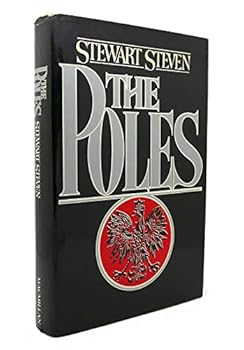The Poles
Select Format
Select Condition 
Book Overview
An informed and perceptive picture of Polish politics and everyday life. This description may be from another edition of this product.
Format:Hardcover
Language:English
ISBN:0026144603
ISBN13:9780026144605
Release Date:January 1982
Publisher:MacMillan Publishing Company
Length:427 Pages
Weight:1.85 lbs.
Customer Reviews
1 rating
The Poles, the Jews, and the Legacy of Communism
Published by Thriftbooks.com User , 18 years ago
Like Norman Davies, Steven is an Englishman who is married to a Polish woman. Unlike Norman Davies, Steven is not a historian. He is a journalist. Nevertheless, he packs in a great deal of Polish history into one volume, supported by a comprehensive bibliography. Steven begins with a brief overview of early Polish history. He then (p. 276) discusses the 1920 Polish-Soviet war. He quotes D'Abernon, who called the Battle of Warsaw (referred to by Poles as "The Miracle on the Vistula") the eighteenth most decisive battle in the history of the world. In contrast to the usual one-sided portrayal of Poland's treatment of her prewar Jews, Steven provides some balance: "In the depression years as Poles sought to discriminate against Jews in an attempt to alleviate Polish poverty and unemployment, so did Jews discriminate against Poles. They did business only with each other, employing only other coreligionists. As one Israeli friend born and brought up in Krakow told me, `It is true that the Poles did have the government on their side, which sometimes made things difficult for us. On the other hand, we had tradition on our side. In the big cities Jews tended to have significant trading advantages for the simple reason that they had been at it longer...It is also true that though my father was assimilated, all the executives in his factory and ninety percent of his workers were Jewish.'"(pp. 313-314). What Steven does not mention is that, having constructed their economic hegemony over then foreign-ruled Poland in the 19th century, Jews commonly engaged in the foregoing-cited practices to ward off nascent Polish competition and thus to protect their hegemony. The much-discussed Polish boycotts, designed to alleviate this hegemony, did not come until later. Steven (p. 312) recognizes the fact that Roman Dmowski called for a reduction of Poland's Jews, by emigration, from 10% to about 2% of the general population, not the complete removal of all Jews. Likewise, the numerus clausus did not bar all Jews from prewar Polish universities. It only restricted them to the same percentage (10%) as in the general population (p. 313). There is even room for irony in Steven's thinking: "And among Jews, few remarks are more calculated to earn one lasting enmity than to suggest, as I once did, that an anti-Semitic Pole is likely to be friendlier to the Jews than a pro-Israeli Englishman."(p. 310). Steven recounts the historical come-uppance against the performance of the Polish Army in September-October 1939:"At the time the Poles were given little credit for their conduct in defense of their homeland...The British Army's Chief General Ironside summed up this view when he said to the head of the British Military Mission in Warsaw: 'Your Poles haven't put up much of the show, have they?'...It took the Germans, with help from the Russians, thirty-five days to conquer Poland, and thirty-five days to sweep the floor with Holland, Belgium, France, and a formidable Brit






